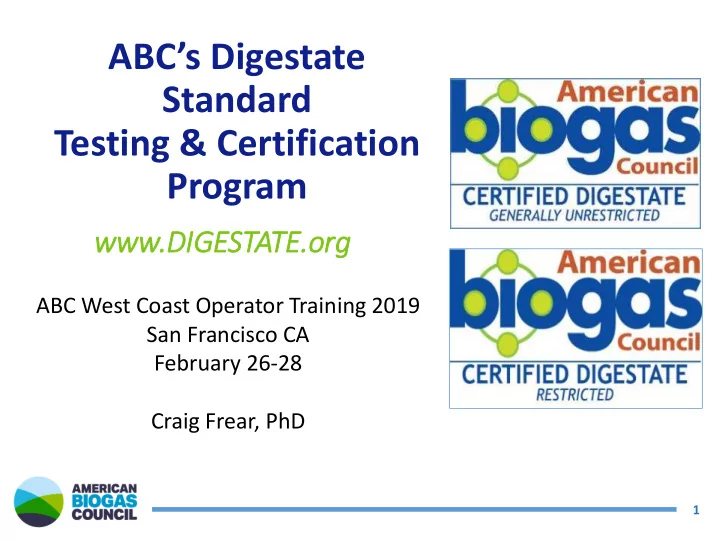

ABC’s Digestate Standard Testing & Certification Program www.D .DIGESTATE.org ABC West Coast Operator Training 2019 San Francisco CA February 26-28 Craig Frear, PhD 1
Typical Digestate Uses S/L Separation Municipal Treatment Field Application Compost/Soil 2
Why Certify • Proof of meeting local, farm, soil regulatory requirements (i.e. pathogens, odor, contaminants, nutrient loading, consistency, metals, etc.). • Determination of range of COD/BOD, metal loading, particular constituents so that pricing/contracts can be realized. • Proof of pathogens, nutrient profile, contaminants so that certification as well as wholesale/retail sales can be realized. 3
Why Important to Show Proof • Secure agricultural field contracts in competitive market; added value; written record in case of regulatory audits/annual reporting. • Reduce costs charged by WWTF, as competitive pricing given with reduced loads and consistency of delivered material. • Secure wholesale and even retail sales in competitive market or achieve higher price points with consistent/tested product delivered. 4
A Little Goes a Long Way Typically digestate is often a loss item on the business books — no price point given or even a charged fee, as well as storage/transportation costs. Positive Scenarios — Allow not just added revenues/reduced costs but more favorable financier investment • No price received, but no fee, and a stable outlet or even contract; • Competitive market, more likely to secure outlet; • Turn regulators/neighbors into friends • Even with small price ($1/ton), significant offset of costs or transportation • 100,000 GPD dairy digester is 150,000 wet tons/year on scale • College campus food digester is 10,000 wet tons/year on scale 5
A New Standard Presently, no such ‘digestate standard’ exists in the US, the ABC has stepped into the void with encouragement from regulatory agencies to develop a robust, sound independent standard. Generally Unrestricted Category • Higher standard for those eying higher value sales • Robust standard similar to EPA 503 Generally Restricted Category • Lower standard, ideal for land-application scenarios 6
Overview of ABC Standard 7
Required Testing: Two Categories 8
Producer Perspective • Step 1: Achieve steady-state digester operation. • Step 2: Sign up, pay fee ($0.06- $0.004/ton), access to Program details, choose certified lab. • Step 3: Test digestate, lab determines pass/fail • Step 4: If Pass? Follow instructions for logo use and marketing for your product’s applied use: • Generally Unrestricted • Restricted www.Digestate.o .org 9
Partnering Lab Perspective • Step 1: Sign up, pay annual fee ($1,300) • Step 2: Third Party Verifier validates registration and responds to lab and Administrator if form and QAQC procedures approved • Step 3: Program Administrator adds your laboratory to the list of certified labs on this site • Step 4: Follow Program instructions • Step 5: Inter-lab validation to be completed in the next 12 months. www.Digestate.o .org 10
What is Inter-Lab Validation • Step 1: Validation happens once every 12 months, run by Third Party Verifier contracted with ABC. • Step 2: One common sample sent to all partnering labs with instructions on tests to perform or intended end use classification. • Step 3: Lab completes testing and sends results to Third Party Verifier. • Step 4: Third Party verifies tests results and communicates a pass or fail to each lab and ABC. www.Digestate.o .org 11
Benefits SUBGROUP BENEFITS Project Developers Establishes best practices/legitimacy for integration into project design, operation and permitting. Enables more detailed discussion with potential off-takers. Provides way to communicate with neighboring properties, stakeholders. AD plant Establishes best practices/legitimacy for training and operations. owners/operators Provides standardized, credible documentation for negotiating offtake agreements and ongoing regulatory compliance. Increases differentiation, value perception in marketplace. Provides way to communicate with neighboring properties, stakeholders. Regulators Provides rationale for regulatory differentiation of inputs (e.g. solid waste) from outputs (digestate) and incorporating this into either voluntary compliance standards or compulsory regulations. Provides industry-accepted protocol for testing, characterization for incorporation into permitting process. Provides ongoing source of data for ensuring permit compliance. 12
Benefits SUBGROUP BENEFITS Digestate Recipients Provides standardized, credible documentation for negotiating offtake agreements and ongoing regulatory compliance. Provides accurate, credible material characterization to determine and monitor digestate composition to ensure highest and best use. Testing Laboratories Provides industry-accepted, standardized array of tests. Provides source of new business. Certification Body Provides source of new business. ABC Provides increased value to existing members and source of new members. Neighbors Source of credible information while plant is operating. 13
Cost Discussion ABC has worked hard to keep costs to producers at low and reasonable rates. The table below details approximate annual fees per scale of project — clearly the annual fees are quite reasonable, considering the work done and value presented. 14
Sign Up Now www.Digestate.o .org 15
Recommend
More recommend